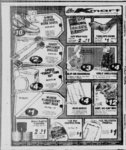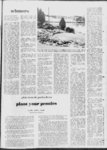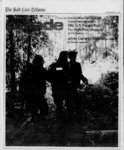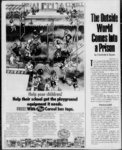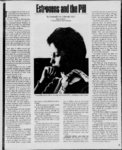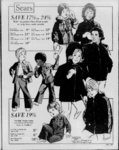| OCR Text |
Show women's group meeting at Friends Outside headquarters in a comfort- able old San Jose house. The women, whose husbands or loved ones are A in jail, get together to discuss mutual problems. The group also has spe- cial classes, weekend outings and a children's summer camp program. graduate now working CONTINUED a couple of volunteers into a jail to start a sewing project. Soon she found she was visiting prisoners' families at their request Many lacked food and clothing and few knew about the social agencies that could help them. Because a member of the family was in jail, they found themselves social outcasts. Rosemary Goodenough quickly began to marshal her volunteers for other tasks besides teaching sewing. With headquarters in a comfortable old house at 712 Elm St. in San Jose, she organized the group she called Friends Outside. Her volunteers began to supply prisoners both men and women with such needs as food, clothing and services. Clubs were transportation formed of inmates' spouses and children. Parties, craft shows, camping programs, youth groups and tutoring projects have proliferated as the volunteers work with inmates' families. One club bears the grimly humorous name of Rockpile Widows. Eventually Friends Outside was established as a nonprofit, nonsectarian foundation supported by local and state agencies. In addition to the parent San Jose chapter, there are 15 others scattered through California. Each has its own clothing stockpile and pantry, as well as a women's club where mothers can discuss common problems and find support through friendship. Each chapter has its own board responsible for programs and funding, and there also is an independent state board. Rosemary Goodenough died in 1972, but her work has gone on. Shortly be- fore her death she achieved one of her prime objectives receiving permission 2 to place a representative inside a state 2 institution, Soledad. She felt this was particularly important because inmates ? at state prisons are more isolated than a those in a jail like Frontera. Stanford Rick Bragdon, a t 12 in Soledad, which houses 2300 prisoners, agrees. "I am one of the few contacts these men have with the outside world," he says. "An inmate comes to my office and says his wife is not writing. I make a phone call and discover that she has been ill. Temporarily I have relieved his anxiety. I have put out a fire." Bragdon has also done some teaching in the prison. One of his most exciting and satisfying ventures, he says, was an "Introduction to Writing" class with 15 enrollees. "It's the little actions we do for inmates that mean a great deal," says Peter Poppleton, 27, representative at Chino, the California Institute for Men. "Many inmates are in prison for the first time, experiencing their first separation from their family." Like all representatives, Poppleton had a month's training before taking his post inside the prison. "I did jail visiting and worked with families to understand the organization's operations," he says. ' v-- l d Frontera's "jailhouse lawyer, inmate Barbara Camp, discusses the ins and outs of child custody law with one of her ''clients.'' self-style- 'Friendship and support Praise for Friends Outside has come from prison officials. Says Allen Brown, associate superintendent at Frontera: "In addition to helping with transportation and family needs the staff has no time for, they provide friendship and support." Adds Jerry Enemoto, California Di- rector of Corrections: "They perform a unique function by helping inmates maintain contact with their families. group who have They are a low-ke- y continued to work behind the scenes, performing unglamorous work, helping in hundreds of ways." But perhaps the most significant testimonial is one sent several years ago to Rosemary Coodenough. It came from a prisoner at Soledad and it read: "You and your organization are responsible for making young men's eyes shine with hope. You have given me the most important tool I need. You have given me my faith back." day-to-d- Nickey Carpenter (I) advises Carmen Rizo. Though Frontera is a minimum security prison, with a swimming pool and tennis courts, inmates confront many of the same problems as do those in more restrictive institutions. |

























